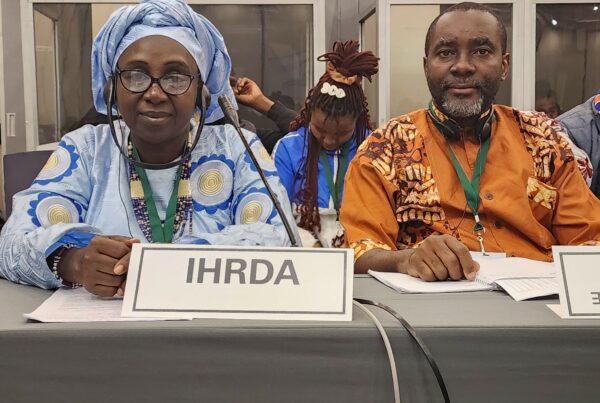44th ordinary session of the African Commission on Human and Peoples’ Rights, 7-22 November 2008 in Abuja, Nigeria
Joint Public Statement of IHRDA and FONADH on the return of expelled Mauritanians to the Islamic Republic of Mauritania
The Institute for Human Rights and Development in Africa (IHRDA) and the Forum des organisations nationales de défense des droits de l’homme (FONADH) would like note their concern over the ongoing repatriation of Mauritanian expellees to their country. The return process has been suffering from mismanagement and lack of efficacy.
The voluntary repatriation operations of Mauritanian refugees to their home country launched on 28 January 2008 was the fulfillment of the claims made by thousands of Mauritanian refugees to get back to their home country in dignity. To date, more than 4,670 deportees have returned voluntarily to Mauritania under the aegis of the UNHCR.
The 6 August 2008 coup which overthrew President Sidi Mohamed Ould Cheikh Abdellahi who had adopted several sharp policy breaks with the past, has raised serious concerns about the future of the repatriation process. The coup has diverted attention and resources away from the remote returnee sites.
After monitoring the process of return since it started in January 2008, IHRDA and FONADH has noted a number of shortfalls. The earliest concerns related to the returnees’ living conditions. The tents provided to returnees were not suited for the semi-desert climate. Water was hard to come by. Proper sanitation was lacking. Returnee children faced a serious lack of schools due to the stark differences in the education systems between Senegal and Mauritania.
Major delays were noted in the re-issuance of citizenship documents to the returnees, with the process taking much longer than the three months specified in the tripartite agreement. In Madina Salam, a returnee site in the Brakna region, in May 2008, that is five months after their relocation, less than 40 percent of the returnees had obtained their national ID cards. Corrective measures were yet to be taken to address these delays.
Returnees cannot go back to their former livelihood in farming because land has not been reallocated as there was no proper land reallocation system. This is contrary to the commitment taken by the Mauritanian government to give back land to those who were deprived of their property during the deportation, thus causing frustration among the returnees. IHRDA and FONADH finds the current method of addressing land restitution claims through the local administrative bodies as ineffective and alternative means of tackling these should be explored.
Despite these improvements, it seems that some returnees are giving up on the process, and the helpless position it puts them. IHRDA can now confirm that some have opted to go back to Senegal where they at least have a chance of independent livelihood, over the dependency of the returnee sites. What may now seem as a trickle could evolve into full retrogress if urgent and concrete remedial measures are not taken.
IHRDA strongly urges the Islamic Republic of Mauritania to:
- Fulfil its obligations to deliver national ID documents to the returnees as specified under Article 16 and 19 of the tripartite agreement with the Republic of Senegal and reaffirm their commitment to improving the conditions of the returnees by taking positive actions that have real sustainable impact for their return to be dignified, such as increasing the resources for durable programmes;
- Establish an ad hoc commission specifically devoted to the management of land restitution. Land matters need to be addressed expeditiously on a case by case basis to deflate rising frustrations and avoid communal conflicts;
IHRDA and FONADH also call on the ACHPR to:
- Continue to follow the process of voluntary return to monitor its compliance with its decision on the deportation of Black Mauritanians.





